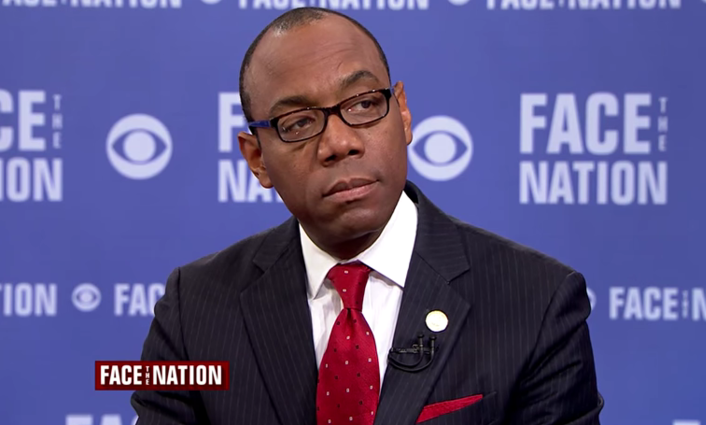William Brooks in a 2014 appearance on Face the Nation
This Wednesday afternoon, NAACP President and Yale Law School alumnus Cornell William Brooks returned to Yale to deliver a speech on “Civil Rights in America, from Selma to Ferguson: Captives or Creators of History.” His address lived up to its loaded title. Over the course of the hour, Brooks discussed a multitude of modern civil rights battles in the U.S., ranging from mass incarceration to voting rights. Underlying all of his policy prescriptions was a deep, history-driven vision for a “Third Reconstruction” of the U.S. Civil Rights movement.
Brooks gave his speech in the same room in which he sat as a law student a couple decades ago. Before his law degree, he also earned a Master’s of Divinity (with a concentration in social ethics and systematic theology) from Boston University School of Theology (Dr. Martin Luther King Jr.’s alma mater). His religious background was evident in his captivating oratorical style. He drew his audience in and told us a passionate, morally-compelling story of the third coming of the civil rights movement in this country.
Brooks was named the new President of the NAACP in May of 2014 — just a few months before the Michael Brown decision and the death of New Yorker Eric Garner sparked nationwide protests about the state of race in the U.S. In telling the story of these past months, Brooks framed them as the next chapter of African Americans’ centuries-long battle for civil rights. He described what he saw as a “Newtonian law of justice” in American history: “for every act of justice there seems to be an equal and opposite action of injustice.” The original Reconstruction yielded Jim Crow “backlash.” The Second Reconstruction in the 1960s was followed by an era of mass incarceration and “nothing less than a Machiavellian frenzy of voter disenfranchisement” since the Shelby Supreme Court decision in 2014. With rhetorically powerful descriptions of the criminal justice system’s “life sentence of unemployment” and the “callous indifference” of people towards disparate police brutality, Brooks called on his audience to envision a “Third Reconstruction” that would set things right. He emphasized the importance of “turning protest moments into a protest movement” so that black activists might be “creators, not captives of history.” He culminated his rousing speech by briefly outlining the NAACP’s “America’s Journey for Justice” plan (a “real reform agenda) that they had launched just a few weeks before.
During the question portion of the event, audience members called on Brooks to specifically address challenges that mass organizers in the black community face today. Though people definitely enjoyed his semi-sermon, they wanted to hear his insight on how best to practically achieve such huge goals. Brooks, impressed by the “sheer number of people hitting the streets,” acknowledged that it was difficult to “move from being energized to being organized.” He shared an audience member’s stated concern about lack of black turnout in municipal, state, and midterm elections, and said we have to work on educating voters on just “how consequential those elections are.” As he has said publicly, he envisions the NAACP as a “standing army of justice” to prevent backwards movement in civil rights affairs.
The tensest question of the session came from a Yale Law School student who had actually personally marched with Brooks in Ferguson. She described a “poignant moment” when talking to a Ferguson local who asked her why she was there, as “the only time you black elite come here is when there is new coverage.” She asked whether Brooks saw a “fundamental tension” in the activism of the “black elite” and the “black underclass.”
He was frank in his response. “If you are going to help the movement from a position of relative power, be comfortable in the fact that people are going to question you.” He said activist leaders face the challenge of “transparency and authenticity” and warned that any Yale alumni involved in social justice work will face these questions. Ultimately, he argued that those with “intellectual capital” can and should participate in movements in parts of the country where maybe no one “had the same opportunity to walk these halls.” He summed up his thoughts poetically: “The lingua franca of political discourse is values…Common interests alone won’t do it.”
These are important words to hear for the many Yale students currently engaging and working towards careers in social organizing. Given recent debates on campus about intersectionalism and the authenticity of Yale progressive movements, these words could not have come at a more relevant time.

